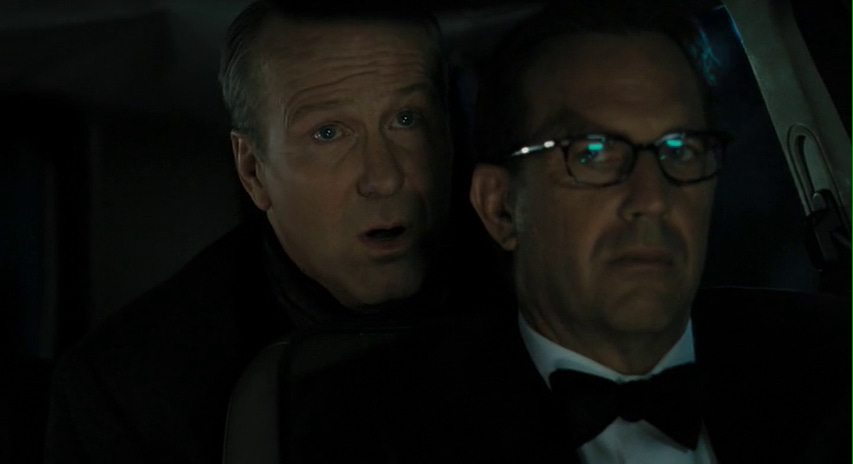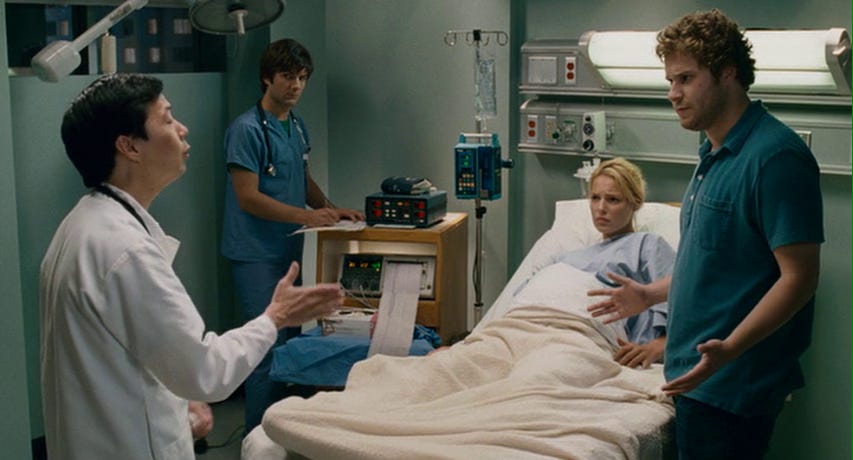There are all kinds of bad art. There is art that is boring; there is art that’s cliché; there is art that is unpleasant to behold; there is art that lacks messaging, so many bad ways to make art. There are likewise many ways for art to be compelling. Art can be interesting, beautiful, inspiring, original, etc. Then there is art that is difficult to categorize. There is art that is arresting, baffling, maybe not well made but still art that compels its beholder to stop and pay attention. This is art like The House On The Rock, a compound in Iowa County, Wisconsin that is so off putting that it has compelled visitors to keep coming back to it for decades since its construction. It is the music of The Shaggs, a rock trio from Fremont, New Hampshire who created music so far outside of traditional rhythm and melody like “My Pal Foot Foot” that it’s difficult to categorize it as either badly performed nonsense or the most advanced avant-garde composition imaginable. The film Mr. Brooks falls into this category. It has nothing to say and doesn’t say it well, but makes so many bizarre choices it’s tough to look away.
Mr. Brooks is the story of Earl Brooks (Kevin Costner) a pillar of his community of Portland, Oregon. Earl owns a highly successful box factory, has a gorgeous wife (Marg Helgenberger), a daughter attending Stanford (Danielle Panabaker), and a psychotic voice in his head named Marshall telling him to kill people (William Hurt). Unbeknownst to the people in his life, Earl lives a secret double life as a serial killer known to the press and law enforcement as the “Thumbprint Killer” for his signature move of leaving a single bloody thumbprint from his victims’ thumbs at the scene of the crime. The film unfolds as Brooks is pursued by the hotshot detective Tracy Atwood (Demi Moore) and is blackmailed into continuing his killing by a turbo douchebag known only as “Mr. Smith” (Dane Cook), who has the only physical evidence of Earl’s crimes in his possession.
Did that sound properly unhinged? I really hope so, but I also guarantee that this film is more unhinged than I can properly do justice. It’s not quite at, say, House (1977) levels of cuckoo bananas, but it’s still completely nonsensical. It mostly feels like director Bruce A. Evans watched some Hannibal Lecter movies and decided “what if I made that but didn’t try to make it make sense?” The result is this beautiful mess of a film.
Kevin Costner delivers a profoundly Kevin Costner performance in this film, both to its merit and detriment. Costner has always struck me as having one mode, and that mode is “cornfed middle-american man whose greatest pleasures are baseball and cold domestic lager”. His best performances lean into this, either because that’s also what the character is all about — i.e. Bull Durham (1988) — or because he’s being pulled away from that mode and the film’s dramatic tension is all about him as a reluctant hero — i.e. Open Range (2003) —. To this end, Costner is eminently believable as a husband / father / box CEO. It does not help him when he’s supposed to be an evil genius serial killer. I suppose that’s why William Hurt is here, who very credibly delivers the “creeping evil behind the white picket fences” vibe. The movie gets weird because I could never really grasp what the nature of their relationship was. Is Marshall an alter and Earl Brooks is suffering from dissociative identity disorder? If so, we never see Costner turn from being Earl into being Marshall the same way, say, Edward Norton slips between alters in Primal Fear (1996). If Marshall is meant to be an inner manifestation of Earl’s latent evil desires, why does he have a distinct identity complete with a different name? At one point Marshall says that he enjoys physical activities like eating and fucking, which is a weird thing to say for a character who has no physical body. Does Marshall feel gustatory pleasure when Earl eats? And why the hell does he dress like he’s about to go direct an off-broadway revival of Pippin? No answers are ever given, so we just have all these moments where William Hurt shows up to say some creepy shit and then disappear in a weird unsettling way. It’s messy, which doesn’t make it unenjoyable, but it definitely makes it messy.
We’re meant to infer a kind of cat-and-mouse catch-me-if-you-can game between Earl and Detective Atwood, along with some “we’re not so different, you and I” energy between them. Demi Moore is a very capable actor who is intensely charismatic. Put a couple of drinks in me at a party and I’ll go into a very detailed take about how Ghost (1990) should be an absolute garbage pile of a movie but for the fact that Demi Moore, Patrick Swayze, and Whoopi Goldberg pull it back from the brink by virtue of magnetic performance alone. I have nothing against Mikey Madison and think she did a great job in Anora (2024) but that Oscar rightfully belonged to Demi Moore. That said, she’s trying very hard to do a kind of William Petersen in Manhunter (1986) thing but Manhunter is a very serious and good movie and Mr. Brooks is a silly and stupid movie. If Mr. Brooks were just a little stupider and campier on purpose, her performance might read like Robert Stack and Leslie Neilsen in Airplane! (1980), where her deadly seriousness would just make the whole thing funnier. As is, it just makes a sloppy movie a tiny bit sloppier.

The story beats of the movie are incredibly silly. Detective Atwood is going through a messy divorce with a restauranteur which is never really explained fully. She’s also independently wealthy via family connections, which somehow drives her to be the greatest cop in the Metro Portland area with a specialty in capturing serial killers. By the way, Portland is apparently lousy with serial killers. Prior to Portlandia establishing the Rose City as being a place known for its fancy coffee shops and feminist bookstores, Mr. Brooks would have us believe that it’s known for its psychopaths. Her life is not merely complicated by attempting to catch the Thumbprint Killer in the midst of a divorce, but also by the fact that a prior serial killer — The Hangman — has escaped from prison and is trying to exact revenge upon Atwood. Earl meanwhile isn’t just attempting to lead his double life of box magnate / Thumbprint Killer, he also needs to contend with his daughter who has just returned from college. She’s taking a gap year, either because she’s been knocked up or because she may have killed someone with a hatchet. Why a Stanford student owns a hatchet in the first place much less uses one as a murder weapon is beyond me.
Also there’s a running theme of serial-killing as a form of addiction, complete with Earl Brooks repeating the serenity prayer and at one point going to an AA meeting to declare “I’m an addict” while conveniently omitting the “murder” part of his addiction. All of these plotlines attempt to intersect: for example Earl Brooks ends up killing the restauranteur ex husband of detective Atwood. One gets the sense that this is meant to build to a big Shakespearean payoff where all the threads tie up in neat-but-unexpected ways, but that payoff never really comes. It’s mostly just confusing.
Then there’s Dane Cook. For those too young to remember, Dane Cook is a stand up comedian who by virtue of telling passable jokes and also being 60% more attractive than most stand up comedians was selling out arenas around the turn of the century. Then sometime around 2010 society writ large snapped out of it and realized that he was not nearly funny enough to merit the kind of attention he was getting. He’s still out there, and I’m sure his jokes are just as medium-funny as they were in 2005, but nowadays he’s selling out the Hard Rock Casino in Gary, Indiana rather than Madison Square Garden. In any case, while the nationwide delusion of Dane Cook as comedy rock star was persisting, he had a handful of acting roles to use his star power to sell tickets to movies. In Mr. Brooks, he plays “Mr. Smith”, a peeping tom who happens to snap a photo of Earl Brooks as he’s freshly murdered a couple who had their blinds open. Rather than the normal reaction of turning Earl in, or the understandable action of blackmailing him for material gain, Mr. Smith opts to blackmail Earl into becoming his serial killer protegé. He wants nothing more than to follow him around, learn his ways, and end up being a criminal mastermind himself. Mr. Smith does not succeed in his goals because he’s a dillweed. Normally if I see Dane Cook in a cast list, I roll my eyes and dread his appearance, but in this instance his role as a whiney guy who sucks really works. This is arguably some stunt casting of an asshole on the same level as Mickey Rourke in The Wrestler (2008). I will not say how Mr. Smith spends his last scene onscreen in this film, but boy howdy was it satisfying to see his final fate, and I can’t help but think that casting a backpfeifengesicht1 like Dane Cook really added to the experience.
I’m going to be honest: I had every intention of reviewing Knocked Up —a much more culturally significant movie that also came out this week— for this week’s essay. Sometimes though our best laid plans are arrested by something that seizes our attention and won’t let go, and for me, this week, that was Mr. Brooks. I cannot reasonably say it’s a “good” movie, but it’s definitely one that’s worth spending some time with. It absolutely has rocks for brains, but is also has thrills for days and some absolutely baffling choices. A jump scare near the end of the film had me howling so loudly that my wife came into the room curious if I needed medical attention. The film is messy as hell, but sometimes what you need is to be messy, and this is the cinematic equivalent of rolling around in the mud on a hot day. Dignified? No. Fun? Absolutely.
Rating: ★★★★☆. A marvelous film to get a little high and watch with friends to hoot and holler at.
Economics: Released 18 years ago today on June 1, 2007, Mr. Brooks performed admirably well for a movie I had no idea existed until I found myself looking at release schedules for 18 years ago. It opened at number 4 at the box office between Shrek The Third at number 3 and Spider-Man 3 at number 5. It would go on to make $28 million at the domestic box office plus $18 million more internationally for a total of $46 million worldwide against a $20 million budget. A modest, but not grand success.
Other 2007 films released this week:
Knocked Up: The first of 2007’s two unwanted-pregnancy comedies is just as acceptable as you remember it. The gross-out jokes are still moderately funny, the homophobia jokes are grossly dated but thankfully few and far between, and a film-long roast of Martin Starr for his unruly beard continues to kill. ★★★☆☆
a marvelous German word meaning “a face in need of a fist”










Imagining an action movie called "Mr. Brooks" in which milquetoast moderate Republican pundit David Brooks goes on a John Wick style revenge rampage. Imagine!: Brooks, surrounded by neo-Nazis in charcoal suits, pulls out a pair of AK-47s (one in each hand) and quips "let's hear from both sides!"
Untitled Dane Cook Box Factory Project.
I’d say it’s squarely early-mid period Adam Scott. Early Adam Scott is Boy Meets World.